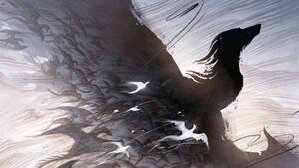The editors of Fiction Unbound have a healthy internal debate over whether historical fiction ‘counts’ as ‘speculative’ fiction. Does Wolf Hall, say—a superb literary-historical crossbreed with no hint of wizards, alternate universes, or technological allegory—fall into our jurisdiction, or not? I’m on the side (actually I pretty much am the side) that says it doesn’t. But I’m willing to put pedantry aside just to talk about Alexander Chee’s The Queen of the Night: That’s how much I loved it.
But maybe it isn’t such a stretch after all. The Queen of the Night, itself a superb literary-historical crossbreed, is anything but shy about the fantastical. The novel follows Lilliet Berne, a celebrity soprano in late 19th-century Paris, and her rise from circus equestrienne to courtesan, from palace spy to opera diva, in a trotting narrative rich with reversals, villains, unmaskings, revenge and transcendence. Few reviewers have passed up the opportunity to compare it to the extravagant plots of a Verdi or Mozart opera; some have meant this as a criticism, which seems off to me, and awfully stuffy. Like Chee says, he has no business writing about opera if he’s embarrassed by the genre’s outlandish coincidences, its ominous curses and beleaguered heroines struggling against Fate. One of Chee’s best tricks is the way he grounds that tragic suspicion—that one’s life is the plaything of the gods—in the concrete ways in which class, gender, and similar structural forces determine Lilliet’s life. Call it a curse, call it heteropatriarchy, but there’s few ways for an author to capture this particular human sensation of helplessness, without the register of the superhuman.
Samantha Hay as the Queen of the Night, in the English Touring Opera's 2014 production of Mozart's Die Zauberflöte (via Boulezian).
Chee is also a gay author, of the Angels in America generation, and The Queen of the Night shares that play's conviction that high camp and high art can and should feed each other. The novel's broad, uninhibited narrative gestures show not just an operatic sensibility, but a taste for the shameless as well; so while it lacks for gay characters, it's still fair to rank The Queen of the Night alongside the other Great, Unabashedly Gay Books of 2015-16.
That freedom to engage the outlandish and improbable, that way of breaking realism’s gravity, is also one of speculative fiction’s cardinal virtues. We can imagine ourselves into such strange places—so why stop at Revolutionary Road? Audiences continue to go to see fairy-operas like Mozart’s The Magic Flute (which gives Chee’s novel its title and structure) as if these bonkers stories still communicate something interesting about being alive, evil sorceresses and all.
And The Queen of the Night is a little bonkers. The novel opens with a triumphant Lilliet Berne, the toast of Paris, confronting a mysterious stranger (naturally, a mysterious stranger) who asks her to originate the lead soprano role in his new opera. But the role is based unmistakably on her own secret past. Only three people know her true, picaresque history: a courtesan turned aristocrat; a handsome, tyrannical Prussian tenor; and the enigmatic Comtesse di Castiglione, the Emperor’s scorned mistress. There was a fourth—but he died in Lilliet’s dramatic escape from the Siege of Paris. Haunting Lilliet at each turn is a curse built into her voice: as a Falcon soprano, she will one day lose her dark, ambitious voice, without warning and irrecoverably.
It’s a mysterious book, one that uses the shadings of voice and voicelessness, of cunning and Fate, to communicate profoundly about art, agency, and love. Months after finishing the book, I still take pleasure in guessing whether I’ve understood it in all its ambivalence.
The novel definitely has a particular type of reader in mind: Someone who finds a hot air balloon escape a delicious turn of events, not jumping the shark. Someone with a rough idea of the Second Empire and the Commune; or else someone who would enjoy browsing those Wikipedia articles. Someone who uses the term ‘sex worker’ instead of ‘prostitute,’ and who can hear both empowerment and exploitation in that term. For this reader, at least, it’s sheer delight. It’s been years since I encountered so satisfying a read, a ripping yarn of a plot spun with Chee’s literary sensibility, and I ate it up like a starving man.
This is the part where I pretend to have reservations, so I don’t sound utterly in Chee’s thrall: OK, Lilliet has more interior monologue than I personally prefer in a first-person narrator. It is not a tight story, but a ranging, loose-limbed epic of a certain woman and a certain Paris. We tend, unthinkingly, to associate ‘literary fiction’ with prose wound tightly around small, unimpressive plots, and ‘genre fiction’ with plots wound tightly around small, unimpressive prose; The Queen of the Night is neither, and sometimes, this shagginess can make you unsure whether you should be enjoying the book as much as you are. It feels a little indecent, a little like cheating. But the answer is yes, yes you should. We desperately need fiction of this sort.













Cadwell Turnbull's new novel — the first in a trilogy — imagines the hard, uncertain work of a fantastical justice.